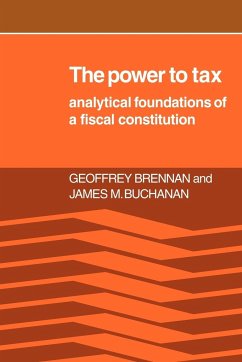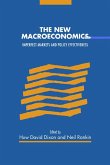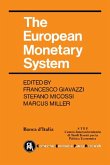Should government's power to tax be limited? The authors offer an approach to the understanding and evaluation of the fiscal system.
Should government's power to tax be limited? The events of the late 1970s in the wake of California's Proposition 13 brought this question very sharply into popular focus. Whether the power to tax should be restricted, and if so how, are issues of immediate policy significance. Providing a serious analysis of these issues, the authors offer an approach to the understanding and evaluation of the fiscal system, one that yields profound implications. Fiscal arrangements are analysed in terms of the preferences of citizen-taxpayers who are permitted at some constitutional level of choice to select the fiscal institutions to which they themselves are to be subject over an uncertain future. The central question becomes: How much 'power to tax' would the citizen voluntarily grant to government as a party to some initial social contract devising a fiscal constitution? Those in office are assumed to exploit the power assigned to them to the maximum possible extent: government is modelled as 'revenue-maximizing Leviathan'. Armed with such a model, the authors proceed to trace out the restrictions on the power to tax that might be expected to emerge from the citizen's constitutional deliberations.
Table of contents:
Preface; 1. Taxation in constitutional perspective; 2. Natural government: a model of Leviathan; 3. Constraints on base and rate structure; 4. The taxation of commodities; 5. Taxation through time: income taxes, capital taxes, and public debt; 6. Money creation and taxation; 7. The disposition of public revenues; 8. The domain of politics; 9. Open economy, federalism, and taxing authority; 10. Toward authentic tax reform: prospects and prescriptions; Epilogue; Notes; Selected bibliography; Index.
Hinweis: Dieser Artikel kann nur an eine deutsche Lieferadresse ausgeliefert werden.
Should government's power to tax be limited? The events of the late 1970s in the wake of California's Proposition 13 brought this question very sharply into popular focus. Whether the power to tax should be restricted, and if so how, are issues of immediate policy significance. Providing a serious analysis of these issues, the authors offer an approach to the understanding and evaluation of the fiscal system, one that yields profound implications. Fiscal arrangements are analysed in terms of the preferences of citizen-taxpayers who are permitted at some constitutional level of choice to select the fiscal institutions to which they themselves are to be subject over an uncertain future. The central question becomes: How much 'power to tax' would the citizen voluntarily grant to government as a party to some initial social contract devising a fiscal constitution? Those in office are assumed to exploit the power assigned to them to the maximum possible extent: government is modelled as 'revenue-maximizing Leviathan'. Armed with such a model, the authors proceed to trace out the restrictions on the power to tax that might be expected to emerge from the citizen's constitutional deliberations.
Table of contents:
Preface; 1. Taxation in constitutional perspective; 2. Natural government: a model of Leviathan; 3. Constraints on base and rate structure; 4. The taxation of commodities; 5. Taxation through time: income taxes, capital taxes, and public debt; 6. Money creation and taxation; 7. The disposition of public revenues; 8. The domain of politics; 9. Open economy, federalism, and taxing authority; 10. Toward authentic tax reform: prospects and prescriptions; Epilogue; Notes; Selected bibliography; Index.
Hinweis: Dieser Artikel kann nur an eine deutsche Lieferadresse ausgeliefert werden.








